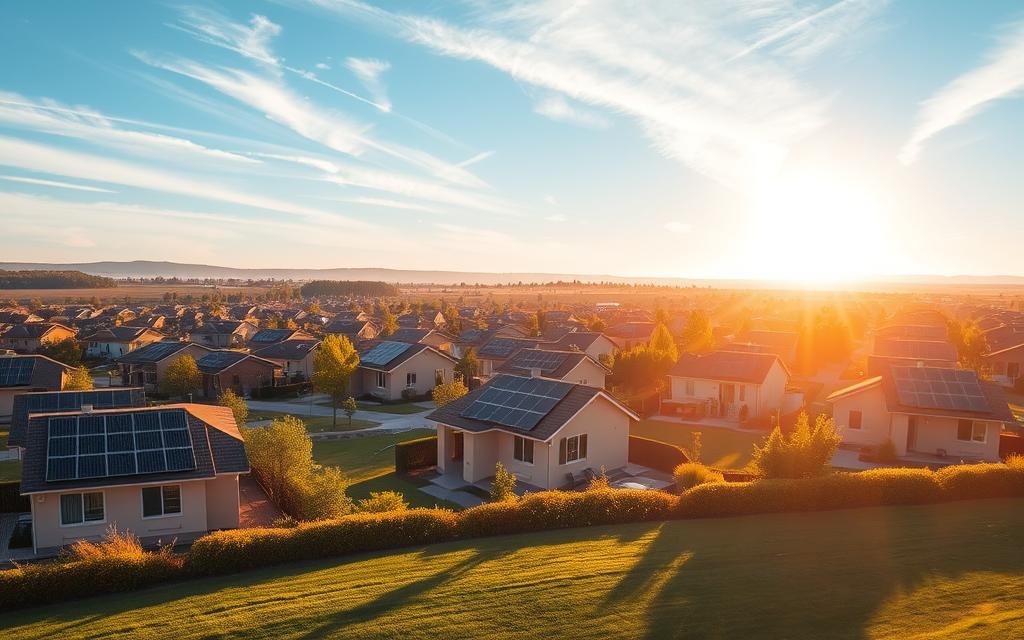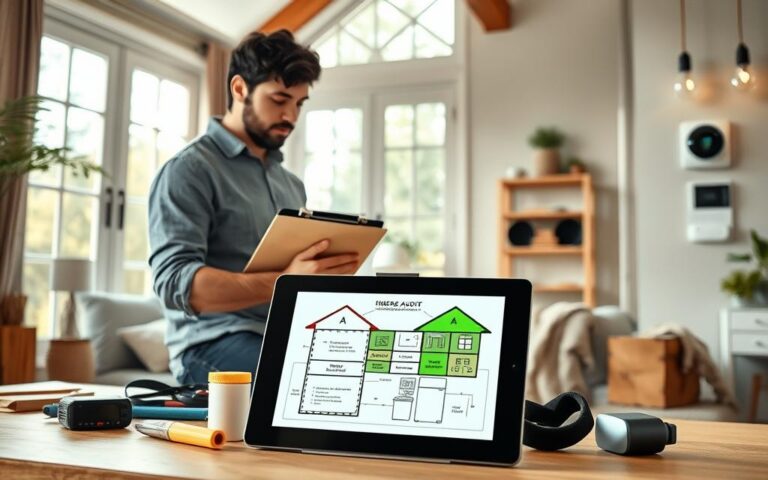Did you know over 3 million homes in the U.S. now use solar systems? This is a 167% increase in just ten years. Homeowners are choosing solar energy for its green benefits and cost savings.
With energy costs going up, more people want to know about solar panels. They hope to cut down on bills and even increase their home’s value. Let’s look into if solar energy is a smart choice, covering costs, benefits to the planet, and what homeowners need to think about.
Understanding Residential Solar Systems
Residential solar systems are a green way to power homes. They turn sunlight into electricity. This is good for saving money and the planet. Knowing how they work is key before looking at costs.
What Are Residential Solar Systems?
Residential solar systems have solar panels on roofs or yards. They make electricity from sunlight. Homeowners pick them to use green energy and cut down on bills.
Components of a Solar System
The main parts of a solar system are:
- Solar Panels: These turn sunlight into electricity.
- Inverters: They change the electricity from the panels into what homes use.
- Batteries: These store extra energy for later use.
- Mounting Structures: They hold the panels in place for best sunlight.
How Solar Energy Works
Sunlight hits the panels, making DC electricity. The inverter changes it to AC for home use. Extra energy can be stored or sent back to the grid for credits.
| Component | Function |
|---|---|
| Solar Panels | Convert sunlight to electricity |
| Inverters | Convert DC to AC electricity |
| Batteries | Store excess energy |
| Mounting Structures | Support and position panels for maximum efficiency |
Benefits of Residential Solar Systems
Getting solar panels for your home has many good points. It helps the planet and can save you money. As more people get solar, these benefits grow.
Environmental Advantages
Solar panels are great for the environment. They cut down on fossil fuel use and emissions. This makes your home’s energy cleaner and helps fight climate change.
Financial Savings on Energy Bills
Solar panels can also save you money. They make electricity cheaper than traditional sources. Plus, you can sell extra energy back to the grid, saving even more.
Increase in Property Value
Solar panels can also make your home more valuable. Studies show homes with solar sell for more. This can be a 6.8% increase, making solar a smart choice.
Initial Investment and Costs
Thinking about getting a residential solar system? It’s important to know the costs first. The price depends on the system size, where you live, and how it’s installed. People want to know the average cost and what financial help is out there.
Average Cost of Installation
The cost of a solar system for homes is usually between $10,700 and $26,600. This price changes based on the local market, your roof, and what equipment you choose. Knowing these details helps you understand the financial side before you start.
Financing Options Available
Looking into solar financing can make it easier to afford. There are a few ways to pay for it:
- Cash Purchase: Paying all at once can save money in the long run.
- Home Equity Loans: Use your home’s value to cover the cost.
- Power Purchase Agreements (PPAs): Pay for the energy, not the system itself.
Each option has its own benefits. You can pick the one that fits your financial situation and goals.
Tax Credits and Incentives
Using tax credits and incentives can lower the cost of solar systems. The federal government offers a 30% tax credit for installation costs. Many states also have their own incentives to help make it more affordable.
| Financing Option | Advantages | Considerations |
|---|---|---|
| Cash Purchase | Immediate savings, no ongoing payments | High upfront cost |
| Home Equity Loan | Lower interest rates, tax-deductible | Risk associated with home equity |
| Power Purchase Agreement (PPA) | No upfront cost, predictable energy costs | Long-term commitment to a provider |
Knowing about these costs and financing options helps homeowners make smart choices about solar energy. It’s key to understand the financial side to get the most out of solar technology.
Energy Efficiency and Savings
Homeowners are looking into solar energy systems for savings. Checking your energy use can show how much you might save. Knowing how solar energy works helps you decide if it’s right for you.
Using a lot of electricity means big savings with solar power.
How Much Can You Save?
The savings from solar systems depend on many things. These include where you live, the size of your system, and how much energy you use. On average, people save over $1,000 a year on their electricity bills with solar panels.
Many things can change how much you save:
- Electricity rates: If rates are high, you can save more.
- System size: A bigger system means more savings.
- Incentives: Tax credits and rebates can increase your savings.
Energy Independence
Getting energy independence with solar is a big plus. It means you don’t rely as much on the grid and save money on energy. This freedom is great during power outages, keeping your energy on.
Net Metering Explained
Net metering makes solar systems even better. It lets you send extra energy back to the grid and get credits. These credits help pay for energy when you need it most.
Choosing the Right Solar Company
Choosing a solar installation can be tough, with many things to think about. Research is key to finding the best solar companies in your area. It helps you understand their reliability and find the right installer for you.
Researching Local Solar Providers
First, look at local solar companies. Online reviews and ratings give a lot of insight into their work and customer happiness. Use credible sources like the Better Business Bureau to help choose.
Key Questions to Ask
When talking to potential installers, have a list of questions ready. Some good ones include:
- What is your experience in the industry?
- Can you provide references from past customers?
- What warranties do you offer on equipment and installation?
- What financing options are available?
- How do you ensure solar provider reliability throughout the project?
These questions can help you make a better choice and find a reliable provider.
Importance of Warranties and Support
Warranties and support are crucial for solar installations. A good company offers long warranties for both equipment and installation. This gives you peace of mind and protects your investment.
Also, ask about support after the installation. Reliable providers should be ready to help with any future problems.
Solar Panel Technology
Homeowners need to know about the different solar panels to use solar energy well. Each type has its own good points and challenges. These affect how well they work and where they fit best. New solar panel tech makes them more efficient and powerful. This part looks at the main solar panel types, their efficiency, and new tech changes in solar energy.
Types of Solar Panels Available
- Monocrystalline Panels: These panels are very efficient. They are made from one crystal and work well in small spaces.
- Polycrystalline Panels: Made from many crystals, these panels are less efficient but cheaper.
- Thin-Film Panels: These panels are light, flexible, and less efficient. They’re good where other panels can’t fit.
Comparing Efficiency Ratings
Knowing the efficiency ratings helps choose the best solar panels. The table below shows how different panels compare:
| Panel Type | Average Efficiency (%) | Typical Lifespan (Years) | Cost per Watt ($) |
|---|---|---|---|
| Monocrystalline | 15-22 | 25-30 | 0.90 – 1.50 |
| Polycrystalline | 13-16 | 20-25 | 0.70 – 1.20 |
| Thin-Film | 10-13 | 10-20 | 0.50 – 1.00 |
Innovations in Solar Technology
New solar panel tech keeps getting better. Bifacial panels can make energy from both sides, boosting performance. Other new ideas, like clear solar panels and solar roofs, make solar energy more common and useful. These advancements help people find the best solar panels for their homes.
Maintenance and Longevity
Keeping your solar system running well needs regular care. It’s important to keep your solar panels in top shape. Simple steps can make a big difference in keeping your solar system efficient.
Keeping Your Solar System Efficient
It’s key to check and clean your solar panels often. Dirt and dust can block sunlight and lower energy output. Clean your panels when you can, especially after storms or in dry seasons.
Also, get a professional to check your system once a year. This can catch problems early and save you money on repairs.
Estimated Lifespan of Solar Panels
Solar panels usually last 20 to 30 years. Good panels come with long warranties, showing they’re built to last. Even as technology gets better, well-maintained panels stay efficient for a long time.
Knowing how long your panels will last is important. It helps you plan and get the most from your solar system.
Common Issues and Solutions
Solar systems are mostly reliable, but problems can happen. Here are some common issues and how to fix them:
| Common Issue | Potential Cause | Solution |
|---|---|---|
| Reduced Energy Output | Accumulation of dirt or debris | Clean panels regularly |
| Incomplete Functioning | Inverter malfunction | Inspect and replace as needed |
| Visible Damage | Physical impact or severe weather | Replace damaged panels |
Government Incentives and Rebates
Homeowners looking into solar systems can get big help from government incentives and rebates. These offers make solar energy cheaper and more accessible for families in the U.S.
Federal Solar Tax Credit Overview
The federal tax credit for solar lets homeowners deduct 30% of their solar costs from taxes. This helps lower the initial cost and encourages more to choose solar. For instance, a $20,000 solar system could cut your tax bill by $6,000, making solar a smart financial choice.
State-Specific Incentives
States also offer extra incentives to make solar more appealing. These vary based on local policies and renewable energy goals. You might get cash rebates, property tax breaks, or incentives based on how much energy you produce. These can greatly increase the value of your solar investment.
Local Rebates and Programs
Local governments and utility companies also have rebate programs to support solar adoption. These rebates can cut installation costs by thousands of dollars. You might get grants, low-interest loans, or discounts on your energy bills. By checking out these local options, you can save more and help the planet.
| Incentive Type | Description | Potential Savings |
|---|---|---|
| Federal Tax Credit | 30% deduction from federal taxes on installation costs | Up to $6,000 on a $20,000 system |
| State Rebate | Direct rebates or performance-based incentives | Varies by state, often $1,000 – $5,000 |
| Local Programs | Cash rebates, grants, or discounts on bills | Varies, often additional $1,000 – $3,000 |
Environmental Impact and Sustainability
Using solar systems has big benefits for the environment. More people and businesses are choosing renewable energy. This choice shows a strong commitment to a sustainable future with solar power.
Reducing Your Carbon Footprint
Solar panels cut down on fossil fuel use. This leads to fewer carbon emissions and less greenhouse gases. Every kilowatt-hour from solar energy helps fight climate change.
Homeowners with solar systems help make the air cleaner. They contribute to a healthier planet.
The Role of Renewable Energy
Renewable energy is changing the way we get power. Switching to solar power makes us less dependent on old energy sources. It also helps protect our environment.
By using the sun’s energy, communities become stronger against climate change.
Long-Term Environmental Benefits
Solar technology offers more than just energy savings. It also means using less water, cleaner air, and less harm to habitats. These benefits last for generations, showing the value of solar power for a sustainable future.
| Benefit | Impact |
|---|---|
| Reduction in Carbon Emissions | Lower greenhouse gases contributing to climate change |
| Energy Independence | Decreased reliance on imported fossil fuels |
| Water Conservation | Minimized water usage compared to traditional energy methods |
| Improved Air Quality | Healthier environment due to reduced pollutants |

Future of Residential Solar Systems
The world of solar energy is changing fast, thanks to new technology and people’s growing interest. More homes are seeing the good things about solar power. Trends show more people are using solar, thanks to better batteries and smart home links.
Trends in Solar Energy Adoption
More homes are getting solar systems, wanting to be energy independent and green. As people learn more about climate change, they turn to solar to cut down on pollution. Programs that share solar power are also getting popular, helping those who can’t put panels on their roofs.
Battery Storage Solutions
Better battery tech makes solar energy more useful for homes. It lets people save energy made in the day for later or when the power goes out. Companies like Tesla and LG are making these batteries work well, helping homes be more self-sufficient.
Integration with Smart Home Systems
Linking solar systems with smart homes is becoming common. This lets homeowners manage their energy better. Smart thermostats and energy trackers work with solar to save energy. It’s a smart way to use solar power to its fullest.
Conclusion: Is It Worth It?
As we wrap up our look at home solar systems, it’s key to think about the good and bad sides. Going solar can save you money, help the planet, and even make your home more valuable. But, you also need to think about the cost upfront, any local help, and how much energy you use.
This guide is here to help you figure out if solar is right for you. Look at your own situation and what’s happening in the solar market. Things like how much energy you use, any rebates in your state, and new solar tech can all play a part.
Starting your solar journey means doing your homework and finding the right fit for you. Whether you want to cut down on carbon or find a reliable energy source, understanding solar systems is crucial. It helps you make a choice that’s good for you and your family.



